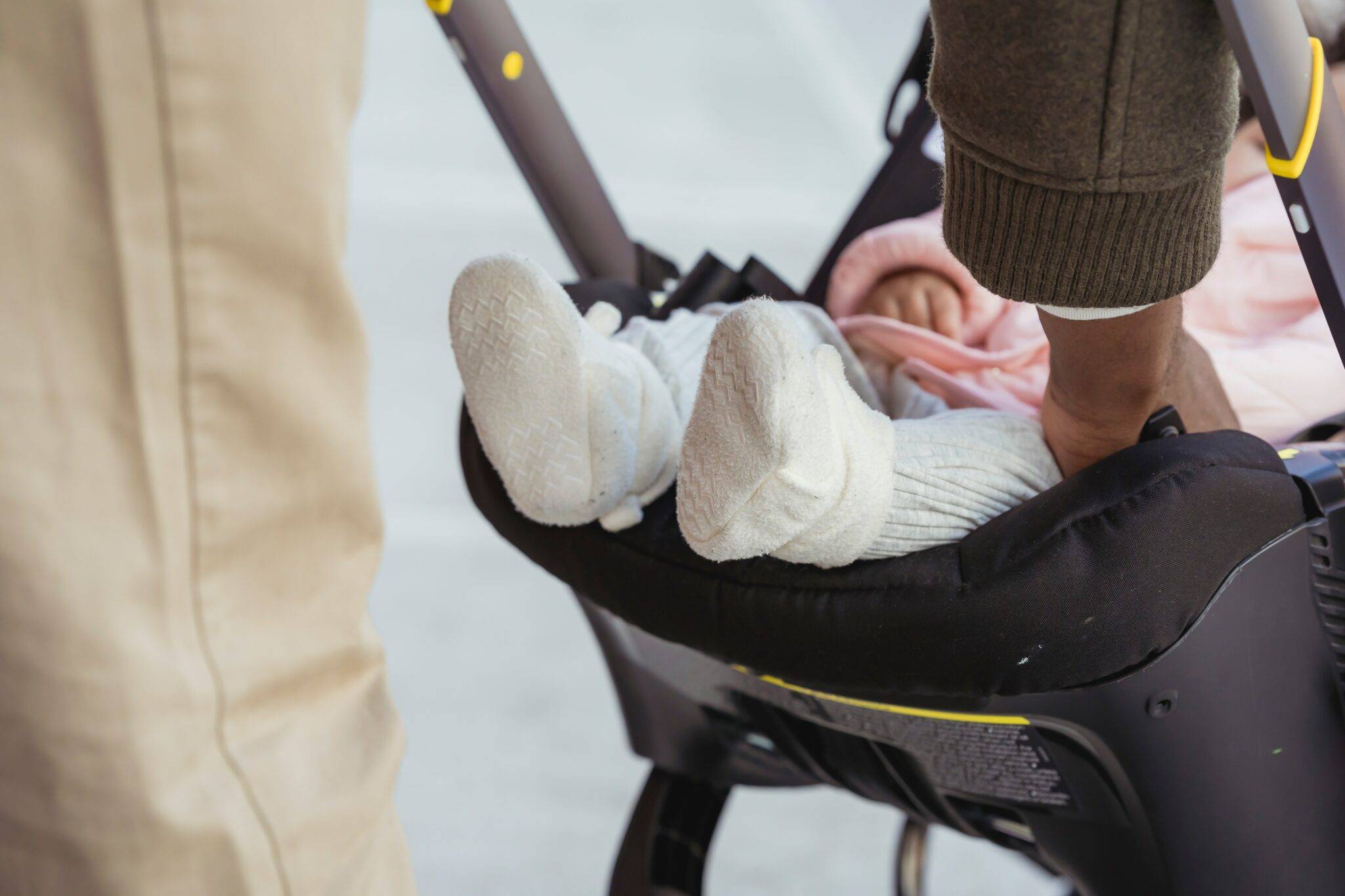Welcoming a newborn into your family is the most joyous and transformative experience. Along with the excitement, however, comes a host of new responsibilities, one of the most significant is ensuring your baby gets the rest they need.
Developing healthy sleep habits from the beginning profoundly impacts your baby’s overall well-being, not just now but in the years to come. This comprehensive guide will provide actionable tips, practical strategies, and expert insights to encourage healthy sleep habits for your newborn, setting the stage for restful nights and peaceful days.
1. Understand Newborn Sleep Patterns and Cues
The Basics of Newborn Sleep
Newborns sleep a lot—generally 14 to 17 hours a day—but this sleep is spread out in short bursts rather than long stretches. These sleep patterns are dictated by the newborn’s need to feed frequently, as their tiny stomachs can’t hold much food at once. This frequent waking is entirely normal and essential for their growth and development.
Unlike older children and adults, newborns don’t have a developed circadian rhythm, the internal clock that regulates sleep-wake cycles, so their sleep is random and disorganized. This is challenging for parents, but understanding these patterns is key to helping your baby get the sleep they need and develop healthy sleep habits.
The Importance of Sleep for Newborns
Sleep is a critical aspect of a newborn’s development. During sleep, a baby’s brain processes the vast amount of information they absorb during their waking hours. This processing helps with memory formation and learning, laying the groundwork for future cognitive skills.
Additionally, sleep is when the body releases growth hormones, which are vital for physical development. Insufficient sleep leads to irritability, difficulty feeding, and slower weight gain. Therefore, prioritize newborn sleep habits like feeding and other aspects of care.
Recognizing Sleep Cues
One of the first steps in establishing healthy sleep habits is learning to recognize your baby’s sleep cues. These include rubbing their eyes, yawning, becoming fussy, or losing interest in play. By identifying these signs early, you put your baby down to sleep before they become overtired, which makes it harder for them to fall asleep.
2. Create a Sleep-Conducive Environment
Setting Up the Perfect Sleep Space
Creating a sleep environment that’s safe and conducive to rest is one of the most important ways to encourage healthy sleep habits in your newborn. The environment in which your baby sleeps impacts sleep quality. Ideally, your baby’s sleeping space should be quiet, dark, and cool.
A room temperature between 68 and 72°F (20-22°C) is recommended, as this range helps prevent overheating, which disrupts sleep and poses a risk of SIDS.
Choosing the Right Sleep Surface
The sleep surface is another crucial factor in your baby’s sleep environment. A firm mattress is recommended, as it provides the necessary support for your baby’s developing spine and reduces the risk of suffocation. The mattress should fit snugly within the crib or bassinet, with no gaps around the edges.
Avoid placing pillows, blankets, or stuffed animals in the crib, as these increase the risk of suffocation and aren’t necessary for your baby’s comfort. Instead, consider using a fitted sheet designed for your crib or bassinet. The right sleep surface promotes healthy sleep habits in newborns.
Swaddling for Comfort
Swaddling is effective in helping your newborn feel secure and calm, as it mimics the snug environment of the womb. Proper swaddling prevents your baby from waking themselves up due to the Moro reflex, an involuntary startle response in newborns. Indeed, constant swaddling promotes healthy sleep habits in newborns.
When swaddling, use a lightweight blanket that’s snug around your baby’s arms but loose around the hips to allow for healthy hip development. Once your baby starts to show signs of rolling over, it’s time to stop swaddling to prevent the risk of suffocation.
Considering White Noise
White noise machines or apps create a sleep-friendly environment by masking other household noises that wake your baby. The consistent sound is soothing, reminding your baby of the steady sounds they heard in the womb. The volume should be low to protect your baby’s ears and position the device at a safe distance from the crib.
3. Establish a Sleep Routine
Why Routine Matters
This is one of the most effective tools for promoting healthy sleep habits in your newborn. Routines provide structure, helping your baby feel secure and understand what to expect throughout the day. This predictability is comforting and makes it easier for your baby to settle down when it’s time to sleep.
While your newborn’s sleep schedule seems unpredictable, gradually introducing a routine helps them establish sleep-wake patterns, an important element in sleep habits.
Elements of a Good Bedtime Routine
A good bedtime routine doesn’t have to be elaborate; it has to be consistent and calming. Common elements include a warm bath, a gentle massage, and a final feeding. Some parents find that reading a short story or singing a lullaby signals to their baby that it’s time to sleep. The key is to do relaxing activities in a consistent order each night.
Over time, your baby will associate these activities with sleep, making it easier for them to wind down. Thus promoting healthy sleep habits.
Timing Your Routine
Start your routine at the same time each evening, ideally before your baby becomes overtired. An overtired baby is harder to settle, as they become more fussy and less able to fall asleep. Pay attention to your baby’s sleep cues, and start the routine when you notice them showing signs of tiredness.
Daytime vs. Nighttime Routines
Differentiate between daytime and nighttime routines to help your baby develop a sense of day and night. During the day, keep the environment bright and engage in stimulating activities. This reinforces the idea that daytime is for being awake and active, a good indicator for developing healthy sleep habits in newborns.
At night, keep the lights dim, the environment quiet, and interactions minimal. This contrast will help your baby gradually learn that nighttime is for sleeping.
4. Encourage Self-Soothing Techniques
The Importance of Self-Soothing
Teaching your baby to self-soothe is important for helping them develop healthy sleep habits. Self-soothing means your baby can fall asleep without being rocked, fed, or held to sleep. This skill is valuable because it allows your baby to fall back asleep on their own if they wake up at night.
Techniques for Promoting Self-Soothing
One effective technique for promoting self-soothing is to put your baby to sleep when they are drowsy but still awake. This helps them learn to fall asleep independently. You can also introduce a pacifier, which can provide comfort and help your baby self-soothe. Another technique is to reduce your involvement in helping your baby fall asleep.
Introducing a Lovey
Around the age of 4 to 6 months, you might consider introducing a “lovey,” such as a small, soft blanket or stuffed animal your baby can hold while they sleep. A lovey can provide comfort and help your baby self-soothe, making it easier for them to fall and stay asleep. Just be sure the lovey is small, breathable, and safe for sleep.
5. Promote Safe Sleep Practices
Following the ABCs of Safe Sleep
Safe sleep practices are essential for reducing the risk of SIDS and other sleep-related dangers. The ABCs of safe sleep—Alone, on their Back, and in a Crib—are the cornerstone of safe sleep guidelines. Your baby should sleep alone in their sleep space, not in a bed shared with parents or siblings.
Babies should be placed on their backs to sleep, as this position is safest for their developing body.
The Role of Room-Sharing
The American Academy of Pediatrics (AAP) recommends that parents share a room with their baby, but not the same bed, for at least the first six months and ideally up to a year. Room-sharing keeps a close eye on your baby and attends to their needs during the night without the risks associated with bed-sharing.
Room-sharing is a good compromise that balances safety with the convenience of having your baby close.
Avoiding Sleep Positioners
Sleep positioners, wedges, and other devices marketed to improve sleep safety are generally not recommended, as they can increase the risk of suffocation. Instead of using these products, focus on placing your baby on their back to sleep and maintaining a safe sleep environment.
Managing Sleep Challenges
Sleep Regressions
Sleep regressions are common in newborns and frustrating for parents. These coincide with developmental milestones, such as rolling over, crawling, or sitting up. During a sleep regression, your baby wakes up more frequently or has difficulty sleeping.
While this is challenging, sleep regressions are temporary. Follow your established bedtime routine, and be patient as your baby adjusts to their new abilities.
Night Wakings
Night wakings are a normal part of a newborn’s sleep pattern, especially in the early weeks and months when they need to feed frequently. Ensure your baby’s sleep environment is comfortable. If your baby wakes up and doesn’t seem to be fed, soothe them back to sleep with gentle rocking, a pacifier, or a soft voice.
If your baby is waking up for reasons other than hunger, such as discomfort or overstimulation, address these issues promptly.
Colic and Reflux
Colic and reflux are common issues that disrupt your baby’s sleep. Colic is characterized by prolonged periods of crying, often in the late afternoon or evening, while reflux occurs when stomach contents flow back into the esophagus, causing discomfort. If your baby has colic, soothe them with gentle rocking, swaddling, or white noise.
For babies with reflux, hold them upright for 20-30 minutes after feeding to reduce discomfort.
Dream Feed
A dream feed is feeding your baby just before you go to bed without fully waking them up. This late-night feeding can help your baby sleep for longer stretches, enabling you to get more sleep. Gently pick up your baby and offer a breast or bottle without turning on bright lights or making too much noise.
When to Seek Help
Recognizing Sleep Disorders
While it’s normal for newborns to have irregular sleep patterns, there are times when sleep issues indicate an underlying problem. If your baby is having trouble sleeping, is overly fussy, or has difficulty feeding, it could be a sign of a sleep disorder or another health issue.
Conditions like sleep apnea, severe reflux, or allergies interfere with your baby’s ability to sleep soundly.
Consulting Your Pediatrician
If you have concerns about your baby’s sleep, consult your pediatrician. They identify potential issues and offer guidance tailored to your baby’s needs. Your pediatrician might recommend a sleep study or other tests if they suspect a sleep disorder, or they might simply offer reassurance and advice on managing your baby’s sleep patterns.
The Role of Lactation Consultants
For breastfeeding mothers, lactation consultants can be an invaluable resource, particularly if your baby is waking frequently at night due to feeding issues. A lactation consultant can help ensure that your baby is latching properly and getting enough milk, which can improve sleep quality for both you and your baby.
Build Healthy Sleep Habits for Your Newborn Baby
Developing healthy sleep habits for your newborn is a gradual process that requires patience, consistency, and flexibility. Understanding your baby’s unique sleep needs, creating a conducive sleep environment, and establishing a consistent routine help build the foundation for healthy sleep patterns that will benefit them throughout their life.
Every baby is different, and what works for one might not work for another. Be patient with yourself and your baby as you navigate this new phase of life. With time, persistence, and a little trial and error, you’ll find what works best for your family.
For more information on newborn care and sleep, visit Omega Pediatrics. You’ll find articles like “Why Newborn Baby Smile While Sleeping: 3 Reasons Behind this Adorable Phenomenon” and “Preparing Your Home for a New Baby: The Ultimate Guide,” which offer further insights and guidance on caring for your newborn.
By staying informed and seeking support when needed, you ensure your baby gets the best possible start in life.








